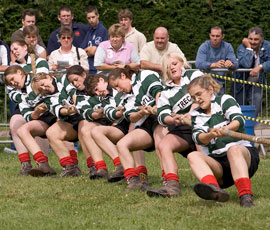Equipping young farmers with NVQs

Young farmers in Cornwall have launched a new scheme to provide members with a qualification in team leadership, benefiting their own clubs and future prospects. Olivia Cooper finds out more.
Young Farmers Clubs have always sought to equip members with skills that will aid them both now and in the future. But often those skills go unrecognised in the workplace due to their intangible nature.
Now, the Cornwall Federation of YFCs and Duchy College have set up an NVQ in Team Leadership, providing valuable training and a recognised qualification to help members with their YFC duties and in their future careers. Initially aimed at club chairmen and secretaries, the course attracted enormous interest, with 60 people from 20 clubs taking part in the first year.
The course, which is the first of its kind in the country, covers resource management, leadership skills, motivation, time management, health and safety, conflict resolution, personnel management and meeting protocol. Training and assessment is carried out in the club or home environment, with successful students earning an NVQ level 2, accredited to the Institute of Leadership and Management. Many of those students are now moving on to the NVQ level 3, says Anthony Ellis, county chairman of the Cornwall YFC.
“The club development programme is the first time any YFC has worked with an agricultural college in this way. This really is at the core of YFCs’ ethos of fun, learning and achievement, and Cornwall is flying the flag for the National Federation of Young Farmers on a national stage. It is hoped this programme will now be rolled out to other counties so that as many members as possible can benefit.”
Kelly Evans, training co-ordinator at Cornwall YFC, says 13 members are taking the level 2 NVQ this year, with 11 on the level 3 course. “In the long-term, we see 15-20 members taking each level every year, with vice-chairmen and assistant secretaries sitting the level 2, and secretaries and chairmen level 3. It’s all about collecting evidence of their skills in a team-leading role.”
At the beginning of the scheme, students are asked to analyse the skills they are likely to need in their role with the YFC, and identify any weak areas for extra training. “Time management, stress management, and conflict management were common areas that we needed to work on,” says Miss Evans. In addition, students were trained in health and safety, media relations and finance.
“We now have members who are qualified for the role they are doing; as a result, the clubs have more structured meetings, and work better as a team, which should mean they hold on to more members, and do better at events and fundraising activities. They can also apply the qualification to any industry; it will benefit them in their work regardless of what they go on to do.”
Case study: Cat Ede
Cat Ede, chairman of the Callington YFC, was one of the first group to sit the NVQ last year. “As vice-chairman, I did the level 2 – and I’ve gone onto level 3 as chairman this year. I thought it would be very valuable as a certificate; and it has given me a lot more confidence and ability to chair meetings, delegate within a team, and know that I am doing everything right. You can tend to get stuck in a mindset, but this challenges you and makes you think in a different way.
“I use my new skills quite a lot, especially in the planning and time management side of things, both in my capacity within the club, my new job at Duchy College, and my personal life.”
Miss Ede is currently studying a foundation degree in agriculture at Duchy College, where she has recently started working part-time as a training co-ordinator. In the future she hopes to combine working on her family farm with extra work elsewhere. “The farm isn’t big enough to support all of the family, which is why I want to get a degree behind me.
“The NVQ in leadership, and my experience with the YFC, will most definitely help me secure a job in the future. The contacts and skills you develop look very good on your CV; it gives you that extra edge.”
The Callington YFC is also working more closely together as a result of the training, she adds. “Each of us who went on the course last year took on a charity event and raised £4,000 to buy a horse for Riding for the Disabled. The team is stronger, more structured, and better organised – over the past three months we’ve raised £3,000 for charity.”
